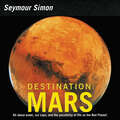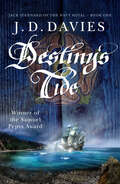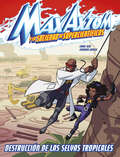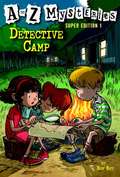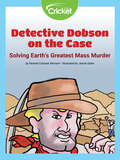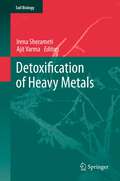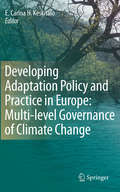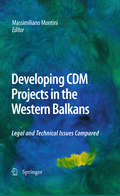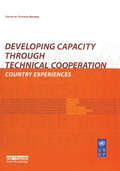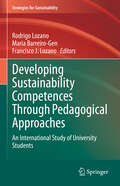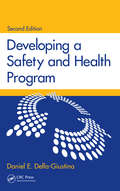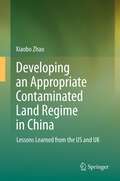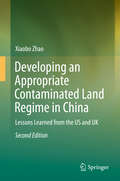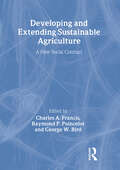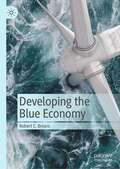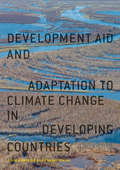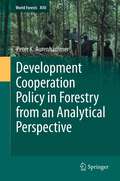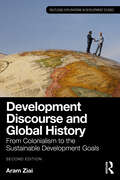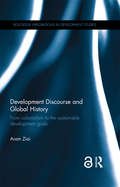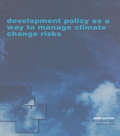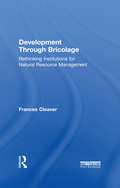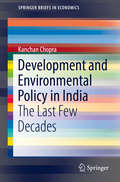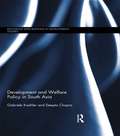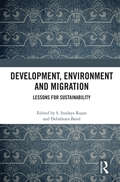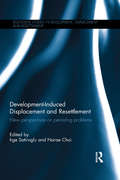- Table View
- List View
Destination: Revised Edition
by Seymour SimonAward-winning science writer Seymour Simon explores the Red Planet through fascinating facts and amazing full-color photographs. Readers will learn about the recent discovery of water, the Valles Marineris—the biggest valley on Mars—the ice caps, recent expeditions, and more. This nonfiction picture book is an excellent choice to share during homeschooling, in particular for children ages 6 to 8. It’s a fun way to learn to read and as a supplement for activity books for children.This updated edition includes:author’s notestunning full-color photographsglossaryindexwebsites and additional reading sourcesSupports the Common Core Learning Standards, Next Generation Science Standards and the Science, Technology, Engineering, and Math (STEM) standards.
Destiny's Tide: An unputdownable novel of naval adventure (Jack Stannard of the Navy Royal)
by J. D. DaviesFight for your country. Fight for your king. Fight for your life... Gripping adventure in the Tudor Navy.Jack Stannard has spent his whole life at sea, enduring savage beatings from his father and the furious aggression of whip-cracking storms. But a more cruel and dangerous foe is on the horizon. When Henry VIII dissolves the monasteries and wages war against France and Scotland simultaneously, Jack must take up his family destiny at the head of the Dunwich fleet.But enemy blades may be the least of his problems. Aging ships, treacherous rivals and ghosts from the past all threaten to interfere with the war effort. The only man he can trust is Thomas Ryman, a former warrior turned monk. As the English fleet descends on Edinburgh, the dangerous game of politics and war reaches a shattering climax aboard the pride of Henry’s navy – the Mary Rose. Stannard and Ryman know that it is not just their lives that are at stake, but the future of England herself...Stuffed to the gunwales with gripping naval combat and adventure, Destiny’s Tide is the first in a thrilling new series set amidst the rise of the Tudor Navy, perfect for fans of Julian Stockwin, C. S. Forester’s Hornblower, and Patrick O’Brian
Destrucción de las selvas tropicales: una aventura de Max Axiom, supercientífico (Max Axiom y la sociedad de supercientíficos)
by Carol KimEn todo el mundo se talan árboles. Pero ¿por qué se talan los bosques lluviosos, y qué ocurrirá si se desaparecen? En esta novela gráfica de no ficción, Max Axiom y la Sociedad de supercientíficos tienen la misión de averiguarlo. Utilizando sus superpoderes y su superinteligencia, el equipo desglosará cada pieza de este complejo problema medioambiental en una aventura emocionante e informativas para que los jóvenes lectores puedan conocer las causas y los efectos de la deforestación y descubrir las medidas que todos podemos tomar para proteger estos frágiles ecosistemas.
Detective Camp (A to Z Mysteries Super Edition #1)
by Ron RoyDink, Josh, and Ruth Rose are back! This time, they're off to a camp for detectives! The camp directors have set up a week of lessons in forensics and fun mysteries for the campers to solve. The kids are following the planned clues when they stumble upon a real crime. This exciting extension to the A to Z Mysteries chapter book series features favorite characters, a longer plot, alphabet clues, and a 26-letter message hidden in the art. "I will be so sad when I have read Z, and there will be no more Dink, Josh, and Ruth Rose."--Jack P. "I think if you're not that busy, you could do every letter again."--Abigail D. With the publication of The Zombie Zone in April 2005, the A to Z Mysteries series was complete. But, A to Z fans, no need to fear ... the A to Z Mysteries Super Editions are here! The fans wanted more, and they're getting it--more adventure, more illustrations, more Dink, Josh, and Ruth Rose--all in a book nearly double the length of standard A to Z Mysteries. The alphabet may be finished, but A to Z fun keeps on coming!
Detective Dobson on the Case Solving Earth's Greatest Mass Murder
by Pamela Culshaw Harrison Janise GatesFollow Detective Dobson as he investigates Earth's greatest "mass murderer" that lead to the greatest extinction event in Earth's history nearly 250 million years ago. Dobson will travel the world investigating fossils- the evidence left behind by the killer that was left behind in the Earth’s crust. Who really was the killer? Was it a Volcano, Climate Change, Poisonous Gas? Help Detective Dobson find the real suspect with paleontology and geology! Will Dobson ever be able to truly find the killer?
Detoxification of Heavy Metals
by Ajit Varma Irena SherametiHeavy metals are severe environmental pollutants, and many of them are toxic even at very low concentrations. With industrial development, soil pollution with heavy metal elements have dramatically increased. The uptake of heavy metals via plants that are exposed to contaminated soils is a risk for human health and a major hazard for the ecosystem as a whole, including soil microorganisms. On the other hand, plants may be used in the decontamination of soils. The topics presented in this book include: sources of heavy metals contaminants in soils; plant species that can grow on contaminated soils; the phytoremediation of contaminated soils; tolerance, accumulation and detoxification mechanisms of zinc, copper, arsenic, cadmium and vanadium in plants; the critical role of sulfur metabolism in heavy metal tolerance; the role of aquatic macrophytes, plant growth-promoting bacteria, sugar crops and earthworms in detoxification; and heavy metal stabilization by promoting zeolite synthesis in soils.
Developing Adaptation Policy and Practice in Europe: Multi-level Governance of Climate Change
by E. Carina KeskitaloMitigation will not be sufficient for us to avoid climate change and we will need to adapt to its consequences. This book targets the development of adaptation policy in European countries with different relations between central and regional/local government.
Developing CDM Projects in the Western Balkans
by Massimiliano MontiniDeveloping CDM Projects in the Western Balkans: Legal and Technical Issues Compared, arises from the professional practical experience gained by an interdisciplinary team of legal and technical experts acting in the framework of the environmental bilateral cooperation performed by the Italian Ministry for the Environment, Land and Sea in the Western Balkan countries, through the "Task Force for Central and Eastern Europe". The added value of the book consists in the fact that it jointly presents the real professional experience gained by a multi sectoral team of lawyers, economists, engineers and other technical experts, working in synergy with a shared vision. This volume will be useful not only to those specifically interested in the Western Balkan area, but represents a broader example of lessons learned in the development of CDM projects. Therefore, it may have a broad market among Government officials and legal-economic-technical professionals dealing with climate change issues as well as academics developing scientific research in this field.
Developing Capacity Through Technical Cooperation: Country Experiences
by Stephen BrowneTechnical co-operation involving northern experts transferring expertise to the south has not always worked. In fact it has sometimes been counter-productive, fostering a dependency on outside help rather than creating a genuine indigenous capability. This study by experts from Harvard University and the UN Development Programme (UNDP) uses a range of country studies to analyze what has worked in the past, what hasn't, and how to ensure that future co-operation results in genuine capacity building and ownership of the new capabilities by the recipients. It aims to offer a framework for evaluating different methods to achieve these goals. The volume is a companion to the earlier Capacity for Development, and should be useful for all those working in international development, as well as researchers, academics and students.
Developing Sustainability Competences Through Pedagogical Approaches: An International Study of University Students (Strategies for Sustainability)
by Rodrigo Lozano Maria Barreiro-Gen Francisco J. LozanoThere has been considerable progress in the incorporation of sustainable development into the curricula of higher education institutions. Study on these developments has included research on competences for sustainable development and pedagogical approaches to develop such competences. However, there has been limited research on the connection between how courses are delivered (i.e. pedagogical approaches) and how they may affect sustainability competences. This book examines pedagogical approaches for developing sustainability competences through comparing 17 higher education institutions from 13 countries, analysing how students&’ perception of how sustainability competences are being developed and which pedagogical approaches are being used for this purpose. This book brings together practice-based original research on the connection between developing sustainability competences and the pedagogical approaches used.
Developing a Safety and Health Program
by Daniel E. Della-GiustinaReflecting changes in the field during the ten years since the publication of the first edition, Developing a Safety and Health Program, Second Edition examines the elements of a safety and health program and delineates how to incorporate them into an organization's safety efforts. It begins by defining safety policy and providing an overview of OS
Developing an Appropriate Contaminated Land Regime in China
by Xiaobo ZhaoLike all industrialized countries, China has encountered increasing problems with land contamination in recent years. Abandoned mining and manufacturing sites and obsolete industrial complexes, while also creating new polluting industrial enterprises, represent impending environmental threats. More importantly, a number of social and economic problems have developed and must be dealt with, in some cases urgently. Contaminated land laws and regulations have been established and have evolved in the US and UK and many other jurisdictions over the past few decades. These regimes have substantially influenced the relevant legislation in the context of numerous Asian and European countries and will inevitably benefit similar legislative efforts in China. This book is the first monograph that focuses on how China can learn from the US and UK with respect to contaminated land legislation and comprehensively illustrates how contaminated land law could be created in China. It will be of interest to academics and practitioners in environmental law in China, as well as the US and UK.
Developing an Appropriate Contaminated Land Regime in China: Lessons Learned From The Us And Uk
by Xiaobo ZhaoLike all industrialized countries, China has encountered increasing problems with land contamination in recent years. Abandoned mining and manufacturing sites and obsolete industrial complexes, while also creating new polluting industrial enterprises, represent impending environmental threats. More importantly, a number of social and economic problems have developed and must be dealt with, in some cases urgently. Contaminated land laws and regulations have been established and have evolved in the US and UK and many other jurisdictions over the past few decades. These regimes have substantially influenced the relevant legislation in the context of numerous Asian and European countries and will inevitably benefit similar legislative efforts in China. This book is the first monograph that focuses on how China can learn from the US and UK with respect to contaminated land legislation and comprehensively illustrates how contaminated land law could be created in China. It will be of interest to academics and practitioners in environmental law in China, as well as the US and UK.
Developing and Extending Sustainable Agriculture: A New Social Contract
by Charles A. Francis George W. Bird Raymond P. PoincelotGet the latest sustainable agriculture practices and keep an eye on the future Developing and Extending Sustainable Agriculture: A New Social Contract explores the challenges faced by today’s farmers and ranchers to provide practical strategies to develop a twenty-first century system of sustainable agriculture that is economically sound, environmentally compatible, and socially acceptable. This comprehensive look at the current state of farming and ranching presents leading authorities discussing concepts and approaches in sustainable agriculture such as crop rotations, integrated pest management, alternative sources of nutrients to maintain productivity, and rotational grazing systems.Presently there is a trend toward a more industrial agriculture and a global food system that will bring long-term negative impacts. If farmers look thoughtfully toward the future, alternatives are now available to help solve these problems to provide agricultural sustainability for generations to come. Developing and Extending Sustainable Agriculture: A New Social Contract provides a model for integrated research and outreach to everyone interested in sustainable development. A sensible framework of practical short-term strategies are combined with visionary long-term plans to provide viable approaches to sustain agriculture, secure our food system, and develop a more equitable society for the future. The text includes several tables and figures, extensive references, and comprehensive bibliographies.Topics in Developing and Extending Sustainable Agriculture: A New Social Contract include: the evolution of the concept of equitable and sustainable development on-farm research farmer to farmer education IPM (integrated pest management) soil management managed grazing whole-farm planning, including economic analysis training for sustainable agriculture motivation theory and research to foster positive sustainable development organic farming productivity the future of sustainable agriculture much, much more Developing and Extending Sustainable Agriculture: A New Social Contract is enlightening, horizon-expanding reading perfect for educators, students, government decision makers, cooperative extension educators, specialists, administrators, citizen members of county extension boards, and administrators in land grant universities.
Developing the Blue Economy
by Robert C. BrearsTraditionally, the ocean economy is viewed solely as a mechanism for economic growth. In this business-as-usual approach, large-scale industrial economies have developed the ocean economy through the exploitation of maritime and marine resources, often without consideration of how those activities impact the future health or productivity of those same resources. This has led to aquatic ecosystems being viewed and treated as limitless resources; the marine environment becoming a dumping ground for waste; overfishing diminishing fishing stocks; ocean habitats being degraded from coastal developments; sea-level rise impacting coastal communities and infrastructure; increasing ocean acidification; and the marginalisation of poor coastal communities.Recognising the failings of the traditional ocean economy, there is a transition underway around the world towards the Blue Economy. This concept moves beyond the business-as-usual approach with economic development and ocean health complementary to one another. In the Blue Economy, the environmental risks of and ecological degradation from economic activity are mitigated or significantly reduced. Therefore, economic activity is in balance with the long-term capacity of the ocean ecosystems to support this activity and remain healthy and resilient. This book will provide an overview of the various technologies used to promote cross-sectoral and multi-scalar collaboration, facilitate the integrated management of sectors and resources, foster partnerships between governments and industry, encourage R&D in new technologies in resource use and management, and scale-up innovative financing mechanisms in the development of a Blue Economy. Also, the book will contain in-depth case studies that illustrate how locations, of differing climates, lifestyles and income levels, have implemented technologies to facilitate the development of the Blue Economy.Developing the Blue Economy will provide an accessible resource for practitioners and researchers working in the field on the various innovative technologies being implemented around the world to create a Blue Economy.
Development Aid and Adaptation to Climate Change in Developing Countries
by Carola Betzold Florian WeilerThis book examines development aid for climate change adaptation. Increasing amounts of aid are used to help developing countries adapt to climate change. The authors seek to discover how this aid is distributed and what constitutes the patterns of adaptation-aid giving. Does it help vulnerable countries, as donors promise, or does it help donors achieve economic and political gains? Set against the backdrop of international climate change negotiations and the aid allocation literature, Betzold and Weiler's empirical analysis proceeds in three steps: firstly they assess adaptation aid as reported by the OECD, then statistically examine patterns in adaptation aid allocation, and finally qualitatively investigate adaptation aid in three large climate donors: Germany, Sweden and the United Kingdom. With its mixed-method research design and comprehensive data, this work provides a unique, state-of-the-art analysis of adaptation aid as a new stream of development aid.
Development Cooperation Policy in Forestry from an Analytical Perspective
by Peter AurenhammerAny reader eager to gain a comprehensive insight into forest development policy, praxis and reality shouldn't miss this excellent publication. Hard to find a comparable reading where the author is digging as deep into Forest Development Policy. The author discovered numerous highly relevant theories as well as inspiring cases about forests and people from around the world, focusing on 'change' rather than 'development' and on the role of various actors in creating or preventing 'change'. The exciting results uncover reality and lead to inspiring discussions on concepts of development cooperation. All individual theoretical arguments and empirical proofs are well based and shed light into the political process of Forest Development Policy. The book is an essential contribution to scholarly debate and research on forestry in the South, and its relations to development cooperation, for both, readers with theoretical and practice related interests.
Development Discourse and Global History: From Colonialism to the Sustainable Development Goals (Routledge Explorations in Development Studies)
by Aram ZiaiDevelopment Discourse and Global History introduces readers to the shifting ways in which people have been talking and writing about ‘development’ over time, and the rules governing the conversation.Drawing on the methods of Michel Foucault, Ziai’s ground-breaking book traces the origins of development discourse back to late colonialism and notes the significant discontinuities that led to the establishment of a new discourse and its accompanying industry. This book goes on to describe the contestations, appropriations and transformations of the concept over time. It shows that trends which have emerged since the 1980s, such as an emphasis on participation and ownership, sustainable development, and free markets, are incompatible with the original rules and so lead to serious contradictions. The Eurocentric, authoritarian and depoliticising elements in development discourse are uncovered, whilst still recognising its progressive appropriations. This new edition includes revisions throughout, and an important new chapter on race and racism, as well as a discussion of the evolution of the Sustainable Development Goals.This book is perfect for students and researchers in development studies, global history and discourse analysis as well as an interdisciplinary audience from international relations, political science, sociology, geography, anthropology, language and literary studies.
Development Discourse and Global History: From colonialism to the sustainable development goals (Routledge Explorations in Development Studies)
by Aram ZiaiThe manner in which people have been talking and writing about ‘development’ and the rules according to which they have done so have evolved over time. Development Discourse and Global History uses the archaeological and genealogical methods of Michel Foucault to trace the origins of development discourse back to late colonialism and notes the significant discontinuities that led to the establishment of a new discourse and its accompanying industry. This book goes on to describe the contestations, appropriations and transformations of the concept. It shows how some of the trends in development discourse since the crisis of the 1980s – the emphasis on participation and ownership, sustainable development and free markets – are incompatible with the original rules and thus lead to serious contradictions. The Eurocentric, authoritarian and depoliticizing elements in development discourse are uncovered, whilst still recognizing its progressive appropriations. The author concludes by analysing the old and new features of development discourse which can be found in the debate on Sustainable Development Goals and discussing the contribution of discourse analysis to development studies. This book is aimed at researchers and students in development studies, global history and discourse analysis as well as an interdisciplinary audience from international relations, political science, sociology, geography, anthropology, language and literary studies.
Development Policy as a Way to Manage Climate Change Risks
by Bert Metz M Kok J TThe integration of development and climate objectives is increasingly recognized as significant in research and policy making. In practice, some development aims, such as poverty alleviation, enhancing energy security and access or improving health, also have potential climate benefits. The challenge is to find a broadly applicable range of effective policies and actions that realize development objectives and at the same time result in real climate benefits. This special issue of the Climate Policy journal focuses on new evidence that identifies options for action, examining how development strategies, policies and decisions can be made more sustainable by integrating climate change considerations and overcoming the barriers that hinder implementation. It also explores what lessons exist for policy at the national and international level and looks at how promising options for local policies can be scaled-up through international initiatives. It also examines how international policy frameworks can create the conditions for integrated development and climate policies. The outcomes provide useful contributions to sustainable development planning on issues such as poverty reduction, rural development, disaster preparedness, energy and transport as well as to the discussions at national and international level regarding next steps to deal with climate change.
Development Through Bricolage: Rethinking Institutions for Natural Resource Management (Earthscan Studies in Natural Resource Management)
by Frances CleaverWhy, despite an emphasis on 'getting institutions right', do development initiatives so infrequently deliver as planned? Why do many institutions designed for natural resource management (e.g. Water User Associations, Irrigation Committees, Forest Management Councils) not work as planners intended? This book disputes the model of development by design and argues that institutions are formed through the uneven patching together of old practices and accepted norms with new arrangements. The managing of natural resources and delivery of development through such processes of 'bricolage' is likened to 'institutional 'DIY' rather than engineering or design. The author explores the processes involved in institutional bricolage; the constant renegotiation of norms, the reinvention of tradition, the importance of legitimate authority and the role of people themselves in shaping such arrangements. Bricolage is seen as an inevitable, but not always benign process; the extent to which it reproduces social inequalities or creates space for challenging them is also considered. The book draws on a number of contemporary strands of development thinking about collective action, participation, governance, natural resource management, political ecology and wellbeing. It synthesises these to develop new understandings of why and how people act to manage resources and how access is secured or denied. A variety of case studies ranging from the management of water (Zimbabwe, India, Pakistan), conflict and cooperation over land, grazing and water (Tanzania), and the emergence of community management of forests (Sweden, Nepal), illustrate the context specific and generalised nature of bricolage and the resultant challenges for development policy and practice.
Development and Environmental Policy in India
by Kanchan ChopraThis book examines the nuances of the relationship between development and environmental conservation policy in India over the last three decades. While India is taken as the focal point, the study extends to an analysis of global aspects and other developing countries as and when the situation demands. Understanding that development always has to take environmental issues into consideration, the book undertakes critical reviews of the different ways in which this has been done. The review is based on a grasp of the simultaneous developments in the theoretical understanding of the environment and ecosystems and provides pointers towards directions for possible change. The motivation for the book lies in the continuing distance between theoretical knowledge of the role of the environment, in particular the underlying long-term links between human wellbeing and wise use of nature, and its application in public policy. The book also proposes that whichever theoretical cornerstone is taken as the starting point, it is the ethical undertones that drive the analysis in directions that acquire meaning in terms of the quality and legitimacy of decision-making. It explores the relevance to policy of a variety of radical conceptual development and policy directions, such as dematerialising growth, the social metabolism approach and the degrowth movement. Further, the dilemma facing environmental policy continues to be how to simultaneously borrow from developments in and across disciplines while at the same time, and at a more practical level, dealing with a diversity of stakeholders.
Development and Welfare Policy in South Asia (Routledge Explorations in Development Studies)
by Deepta Chopra Gabriele KoehlerThis book sheds light on social policies in six South Asian countries introduced between 2003 and 2013, examining the ways in which these policies have come about, and what this reflects about the nature of the state in each of these countries. It offers a detailed analysis of the nature of these policies introduced in recent years in Bangladesh, India, Maldives, Nepal, Pakistan and Sri Lanka, and illustrates the similarities and differences in policy approaches amongst the six countries. Through this analysis, the book explores the thesis of whether there is a particular type of ‘developmental welfare state’ that can be observed across South Asia. The focus is on social policies or policies designed to address poverty and deliver welfare at the level of programming and design, i.e. the stated intent of these policies. The book also presents an analysis of the fiscal space available in each of the six countries, thereby drawing conclusions about the financial feasibility of a ‘developmental welfare state’ model in the region. This comprehensive book uniquely explores critical aspects of policy debates on a possible move from welfare to ‘rights’. It introduces students and researchers in development studies, social policy and South Asian studies to innovative welfare programmes in South Asia and gives a new perspective on the nature and patterns of welfare in South Asia with the view of tackling inequality and promoting well-being.
Development, Environment and Migration: Lessons for Sustainability
by S. Irudaya Rajan Debabrata BaralThis book brings the discourses around social justice and sustainable development back into focus by looking at India’s mining sector and the state’s frameworks for economic development. The chapters in this volume analyse mining practices in the mineral-rich areas of eastern India through various case studies and highlight their immense human and environmental costs. This volume critically analyses selected mining projects in India that have resulted in large-scale displacements, impoverishment and environmental degradation. It identifies the gaps in policy, its implementation, and the lack of safeguards which threaten the socio-economic and ecological ways of life and the livelihoods of the local communities. Based on documents, reports, interviews and field observations, this book engages with the issues surrounding the mining sector, e.g., land acquisition, land use and degradation, the politics of compensation, policies, agitation and social mobilisation, health and agriculture, livelihood and gender. It further provides an assessment of local political economies and offers suggestive frameworks for inclusive growth in this sector. This book will be of interest to students and researchers exploring the disciplines of development studies, sociology, law and governance, human ecology and economics.
Development-Induced Displacement and Resettlement: New perspectives on persisting problems (Routledge Studies in Development, Displacement and Resettlement)
by Irge Satiroglu Narae ChoiEvery year millions of people are displaced from their homes, livelihoods and communities due to land-based development projects. There is no limit to what can be called a ‘development project’. They can range from small-scale infrastructure or mining projects to mega hydropower plants; can be public or private, well-planned or rushed into. Knowledge of development-induced displacement and resettlement (DIDR) remains limited even after decades of experience and research. Many questions are yet unanswered: What is "success" in resettlement? Is development without displacement possible or can resettlement be developmental? Is there a global safeguard policy or do we need an international right ‘not to be displaced’? This book revisits what we think we know about DIDR. Starting with case studies that challenge some of the most widespread preconceptions, it goes on to discuss the ethical aspects of DIDR. The book assesses the current laws, policies and rights governing the sector, and provides a glimpse of how the displaced people defend themselves in the absence of effective governance and safeguard mechanisms. This book is a valuable resource for students and researchers in development studies, population and development, and migration and development.
